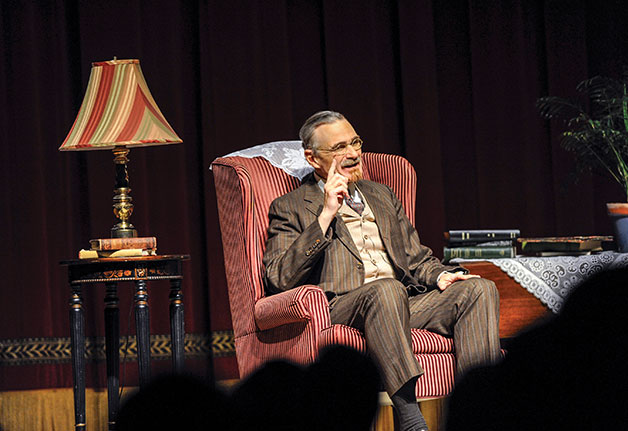An Evening with Sholom Aleichem…
but first an afternoon drive with Murray Horwitz
When Murray Horwitz came to Wofford College on Feb. 11, he wasn’t on campus as the working clown that tickled fits of laughter from Ringling Brothers and Barnum Bailey crowds for three years. He wasn’t in Spartanburg as the writer of the Tony award winning musical “Ain’t Misbehavin’” or as the creator of the NPR game show “Wait… Wait… Don’t Tell Me.” He wasn’t even here are the busy director who cheerfully bounced from question to question during a cell phone interview as he was on his way to meet Wynton Marsalis for a concert rehearsal. Instead — at least for a while — he took on the persona of Sholom Aleichem, sometimes referred to as the Yiddish Mark Twain, bespectacled and biting, charming but unapologetically honest, telling stories of 19th century Jewish life as only he could.
Just a few minutes with Horwitz is enough time to know that he brings something special to every performance or project, whether that be writing lyrics to John Harbison’s “The Great Gatsby” at the Metropolitan Opera or his musical for young audiences, “Magic Tree House: A Night in New Orleans,” (written with Allen Toussaint) or even writing and directing the phenomenally successful 2014 concert at Constitution Hall to mark the 75th anniversary of Marian Anderson’s historic Lincoln Memorial recital.
“Early on I discovered one of the great truths of life,” says Horwitz. “Everything is interesting. And turning my hand and attention to those things makes life more fun.”
The stories of Sholom Aleichem (pen name of Soloman Rabinowitz that means “peace be with you”) grabbed his attention early. Horwitz spent a good deal of time in the Dayton, Ohio, public library as an elementary-aged student and particularly enjoyed the spoken-word records section. He discovered the stories of Sholom Aleichem at about the same time that his aging grandfather, a Russian immigrant, moved in with the family. Horwitz’s grandfather knew the stories and read them to him in Yiddish. They bonded over the experience, and Horwitz carried the memories and lessons with him as he entered college. Horwitz now takes great pride in bringing the stories back for modern audiences.
“Millions, literally millions, of the people who would have read the works of Sholom Aleichem perished in the Holocaust,” says Horwitz. “Others who left Russia, Poland and other Yiddish-speaking places for the United States assimilated and stopped speaking Yiddish. Only in the past 30 to 40 years is Sholom Aleichem being recognized for the enormous output and intellectual range of his work that included plays and novels, not just the Tevye short stories made famous by ‘Fiddler on the Roof.’”
Horwitz’s “An Evening with Sholom Aleichem” at Wofford College provided humor, “the type of humor that lets us know that we’re all in this together,” he says. “It’s not sentimental or soft. It’s got real targets and barbs, but it’s good-natured and inclusive.”
According to Horwitz, everyone can see something of themselves in the stories he shares during the one-man show. Although the world of Sholom Aleichem has essentially vanished, the truths revealed during the play and the rainbow of characters are enduring. Horwitz concluded the show by reading the will of Sholom Aleichem.
“The ethical will is a traditional Jewish idea that we can pass on to our heirs non-material things,” says Horwitz. “Sholom Aleichem’s will combines the ethical will with his legal will, and with it he leaves instructions for the rest of us on how to comport ourselves.”
Horwitz, now the director of special projects for Washington Performing Arts, has won the National Medal of Arts and his projects have garnered three Peabody Awards, a Tony, an Emmy, an Obie and a Grammy. He was invited to present “An Evening with Sholom Aleichem” at Wofford College by Wofford President Nayef Samhat, who became friends with Horwitz during their work with Kenyon College, Horwitz’s alma mater.
In addition to his passion for his family, comedy and music (particularly jazz), Horwitz also is passionate about the value of a residential, liberal arts education, like the type he received at Kenyon and the type that Wofford College offers its students.
by Jo Ann Mitchell Brasington ’89
